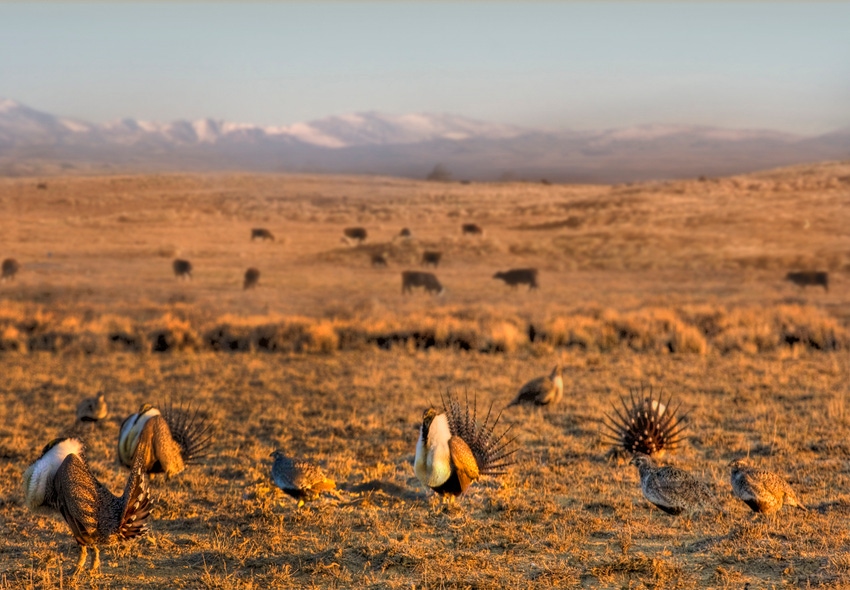Wyoming governor and Florida rancher testify on importance of updating Endangered Species Act.

Florida rancher Liesa Priddy testified before the Senate Environment & Public Works (EPW) Committee on Wednesday on behalf of the National Cattlemen’s Beef Assn. (NCBA) and the Public Lands Council (PLC) to support to S. 4589, the Endangered Species Act (ESA) Amendments of 2020, and to highlight why this bill is desperately needed to modernize ESA.
The hearing also featured testimony from Wyoming Gov. Mark Gordon and Defenders of Wildlife president and chief executive officer Jamie Rappaport Clark. The legislative hearing focused on legislation introduced by Senate EPW Committee chairman John Barrasso (R., Wyo) to reauthorize the ESA for the first time since 1992, to elevate the role of states and to increase transparency in the implementation of the ESA. It also prioritizes resources to help meet conservation goals while providing regulatory certainty to promote recovery activities.
“Since the Endangered Species Act was signed into law, fewer than 3% of listed species have been recovered and delisted. This is failure, not success,” Barrasso said in his opening statement. “We must do more than just list species and leave them on life support. We need to see them recovered and delisted. The Endangered Species Act Amendments of 2020 will go a long way to achieving this goal.”
"We are all concerned about what would happen if the ESA weren’t effective, but I think – in large part – we’re already there," Priddy said. "The ESA has achieved some significant and popular recovery efforts – the bald eagle and the manatee are just two examples – but thousands more species have languished on the list due to lack of attention and a system that just hasn’t worked for them."
Priddy backed the legislation introduced by Barrasso that empowers states to lead recovery efforts and gives stakeholders, like ranchers, who make significant investments in voluntary conservation, a more meaningful seat at the table in recovery discussions.
"I fully support your proposal to allow states to lead recovery teams during the ESA process," she said. "States have primacy over wildlife management, meaning they bear sole responsibility for ensuring laws, science and partnerships are in place to have robust populations. In cases where a species needs additional assistance, states’ knowledge, authorities and partnerships are still valuable. Allowing states to demonstrate that leadership recognizes their broad capacity to manage and provides certainty to ranchers like me who have invested in conservation activities long before an ESA listing was contemplated."
Priddy thanked Barrasso for his work to provide a clear path to recovery by improving the information available to the agencies, providing a clear framework to achieve recovery goals and supporting a delisting decision once recovery goals have been met.
"By supporting other key functions of the act, like the five-year post-delisting monitoring period, the bill also recognizes that delisting is a key recovery objective," Priddy said. "Through the recovery process, states and the U.S. Fish & Wildlife Service make ongoing investments that plan for the future. Those plans are developed by experts and are implemented by experts. Like you, I have confidence that states have the capacity and expertise to manage recovered species, and the integrity of those management plans should be supported. ... I believe this bill will be better for ranchers, better for states, better for the federal authorities and better for the species.”
Gordon detailed the importance of allowing states and tribes to play a large role in wildlife management, noting, “The work states and tribes carry out every day across our country for imperiled species conservation is a vital component to the discussion of recovery efforts. Despite the fact that little to no federal funding exists to support state’s efforts nor that no specific mandates require states to take certain actions in the ESA, they do it anyway. Critics of amending the act seem to insinuate that states do not want to conserve at risk species or that states lack the capacity and expertise. Nothing could be further from the truth.
“The public trust doctrine outlined in the North American Model of Wildlife Conservation is the bedrock for wildlife conservation in our country," he added. "Most wildlife in our country are managed, and managed quite well, by state and tribal governments in trust for their citizens. I am proud of the significant achievements state wildlife managers in my state and others across the nation have accomplished. Wildlife continues to be abundant and diverse, and this is due in large part to the efforts of states and tribes.”
Gordon also discussed the wildlife management and species conservation specifically in Wyoming, using examples of grizzly bears, gray wolves, the black-footed ferret, the greater sage-grouse, the Wyoming toad and the Canada lynx. “Wyoming is proud to be a leader in managing at-risk species and recovering those species listed under the act. We have also taken a proactive role to address challenges before a need arises to list species under the act. Wyoming has many notable examples of contributions. Some demonstrate ESA successes, and some demonstrate areas where ESA improvement is warranted,” Gordon said.
About the Author(s)
You May Also Like



.png?width=300&auto=webp&quality=80&disable=upscale)

